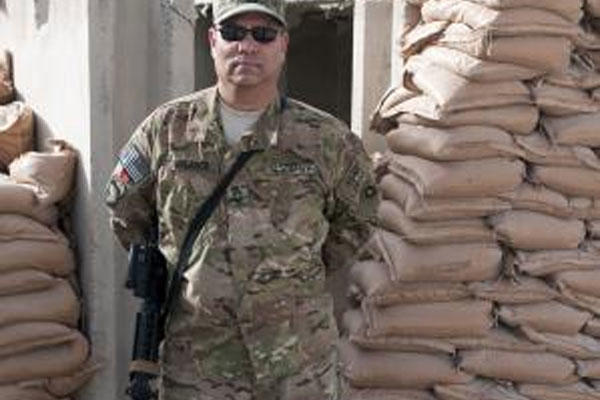KANDAHAR AIRFIELD, Afghanistan — Fighting and surviving a war on terror is no easy task. Neither is surviving almost three decades of service in the Army Reserve. Fighting and surviving cancer is a whole other level of difficulty. Combating all three simultaneously sets the bar so high, it seems insurmountable. For one soldier serving in the 311th Expeditionary Sustainment Command, it’s entirely possible.
Master Sgt. Larry Velasco is a cancer survivor assigned to the 311th’s support operations section and currently serving here and he couldn’t be happier.
“I wanted to support my unit and the troops in Afghanistan with my skills and training I have been provided with by serving over 30 years of service,” said Velasco. “I am a soldier. I want to serve my country and make my Family proud.”
Velasco, a Los Angeles native, had served more than 17 years in the Army Reserve when he was diagnosed with thyroid cancer and he believed this revelation would end his military career.
“In October 1993, I started getting very weak after returning from annual training that summer. So after several hospital trips, a doctor conducted a test out of the blue, and the test came back positive for thyroid cancer,” said Velasco. “In April 1994, I had the operation to remove my thyroid and had to undergo chemo for two years.”
But he wouldn’t submit to the cancer, the treatment or the illness. He decided to fight.
“I set forth a goal to return back to the Army Reserve so I can fight in Iraq and Afghanistan,” said Velasco. “This is not going to stop my career.”
For obtaining a role in his current deployment, Velasco said medical testing was the main obstacle to overcome.
“I pushed myself and with help of my family and a fellow noncommissioned officer, I was good to go for the deployment,” said Velasco. “I met the standards of the Army support structure for deploying to a battlefield.”
After his surgery and years of treatments, Velasco has returned to the fight and participated in multiple deployments. He has learned a lesson he thought other service members, and even civilians, might benefit from.
“Cancer is not the end of a career, a life or the world,” he said. “It’s how you fight it.”



























